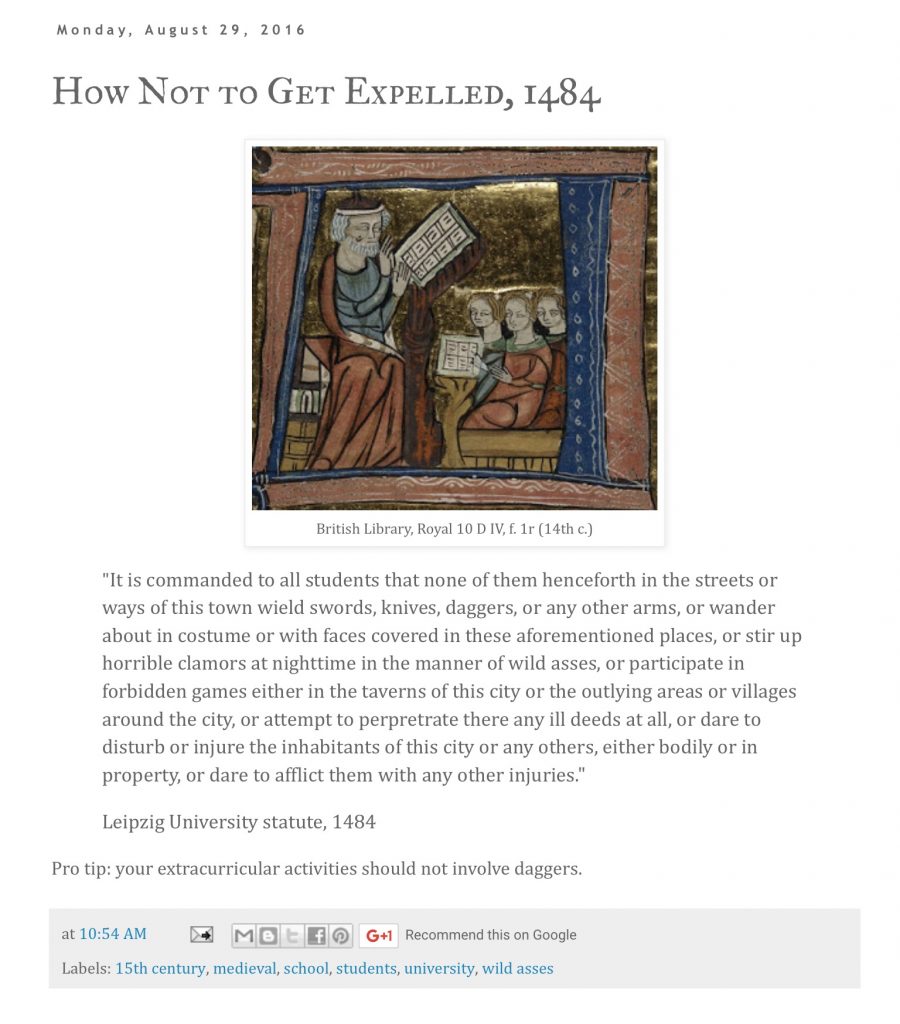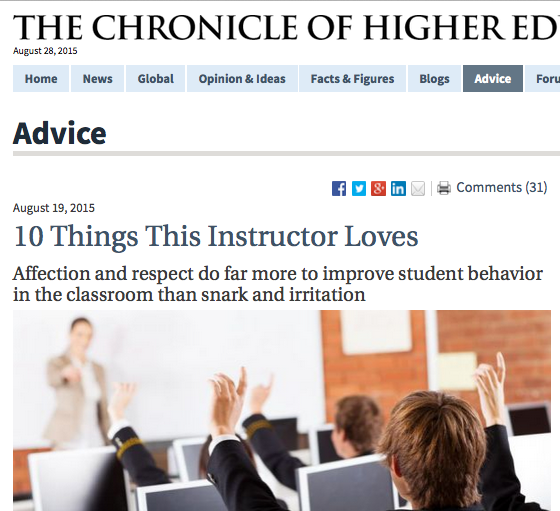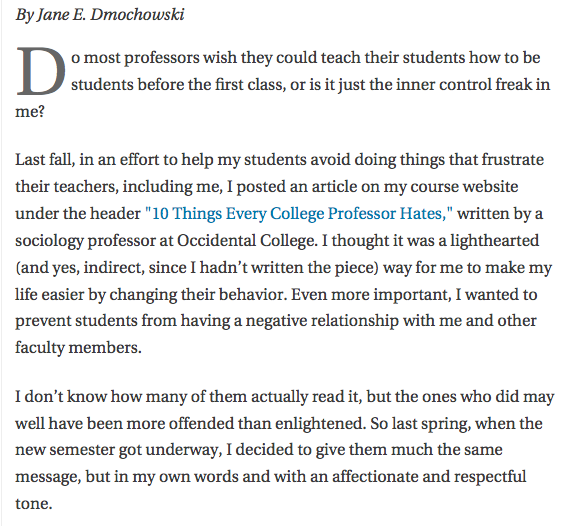Syllabus III : « THE RULES »
MENU: AIMS, OBJECTIVES, EXPECTATIONS, RESPONSIBILITIES, GRADING CRITERIA
→ I. Aims and objectives
→ II. Expectations
→ III. Responsibilities
→ IV. Grading criteria
→ V. Plagiarism
→ VI. Late work & extensions
→ VII. Quick links to UBC rules, policies, and procedures
CAVEAT AND PREAMBULATORY FIRST RULE
THE CAVEAT
There is a lot of information here below. That is because it is intended to be as comprehensive as possible, in the interest of helping you. There are also links to selected parts of UBC’s rules and regulations (carefully gleaned for pertinence) and to further information sources of and associated with the University: all in all, there is a lot to read. (There may also be Easter Eggs.)
The « search » button and the standard « find » / « spotlight » functionality may be helpful.
You are reminded that students are expected to be cognisant with University rules and regulations: this is part of the contractual agreement every student enters into with the University when they register. The same goes for any course and programme.
“tl;dr” is not a defence, nor an excuse, nor generally acceptable at the university level. This is a good and positive thing because of…
THE FIRST RULE: WE ARE ALL MEMBERS OF THE UNIVERSITY
You are responsible intelligent adults. I (O’Brien) expect you to think, act, and communicate accordingly. You should expect me and everyone else you deal with at the University to do so too: this gives parity and mutuality to our academic work and intellectual relations and interactions.
UBC’s motto, tuum est—« it is yours »—is a reminder of what a university is and what universities have been for their long history: a unified scholarly community, with scholars of various sorts–from first-year undergraduate students to senior professors–united in the adventure of scholarship. You are as much a part of that as anyone else, with the same obligations of good scholarly citizenship. We all reap the benefits: individually and immediately, and as a larger entity over a longer time.
See further: the Golden Rule (via the Wikipedia).
I. AIMS & OBJECTIVES
See also: specifics for this course, in the syllabus.
It/we also hope to provide you with, as a bonus,
- a love for learning
- some enjoyment and pleasure
- an awareness of the potential of language and literature to open up other worlds to you, and to provide an infinite resource of comfort and consolation: leading you to different ways of thinking about the world, seeing it from a different perspective.
- = useful life skills, whatever life you choose to lead and wherever life takes you after this course
II. EXPECTATIONS
What you should expect from this course:
- an interactive format, that will include some short lectures (= live performance explanation, commentary, and analysis leading up to asking questions so as to open up full discussion)
- discussion, work in groups and individually, intensive writing and thinking
- reading, in the full sense:
—reading, rereading, thinking while reading, making notes, rerereading, etc.
- writing, every week:
—most of this will be short; in a variety of forms; intended to be non-traumatic but intensive
- to learn:
—through a combination of lectures, discussion with peers, and your own independent initiative
- to learn to enjoy and maybe even love learning
—(especially via linguistic geekery)
—for this is what « education » is
—and a major step towards becoming, in the longer term, « educated » and a philologist and/or philosopher
III. RESPONSIBILITIES
(In proper 18th-century social-contract style.)
You will be expected to:
- attend class:
—regular attendance is expected of all students
—unexcused absences and late arrivals will drastically affect your final grade
—attendance is one of your obligations as a UBC student: UBC Policies and Regulations > Attendance
- be courteous, respectful, and tolerant of others:
—generally behave in a decent civil adult human way
—know and act in accordance with University, Faculty, and other applicable rules; and be familiar with principles of justice and fairness, and their application to everyday life
—before speaking or acting, consider the consequences and think of your fellow students (and their possible reactions and sensitivities)
—think, similarly, of other fellow human beings such as faculty and staff: remember that your instructor is a person too
- bear in mind that your instructor has limits:
—I can only do for one student what I can also do for every other student in the class/course; and I cannot do something for one student that I could not also do for every other student (ex. individual tutoring). This may mean making decisions that go against a student’s individual self-interest, when acting in the interests of the greater good.
—There are some times when I will not be accessible and available. Instructors (= faculty + student and postdoc TAs) are not customer-service-bots. They will be unable to read and answer emails while doing other work that requires concentration: ex. while teaching you, preparing your classes, and marking your work.
—Instructors are humans and need to rest (evenings, nights, weekends), the better to work with you. Respecting your instructor as a human is therefore also in your own interests.
- work and be attentive:
—attend class in an active, attentive manner:
please bring food and drink if you need to (especially for a lunchtime class; and you may bring coffee, tea, and chocolate as they are sustenance in the non-European world of our historical period)
—use of electronic devices in the classroom:
you may use whatever you wish (laptops, tablets, smartphones) and with which you are comfortable;
you may also record the class, audio only and only for the purposes of the class and use by its participants (no selling when a fellow student becomes famous);
and you may of course photograph the chalkboard, projector, etc.: indeed, this is actively encouraged (I often have students take turns to act as « scribe » in class); but please don’t photograph me—I have an inalienable right to bad hair days etc.—and please don’t photograph or record your fellow students without their prior permission and continuing consent… as a matter of medievalist courtesy
—think and ask questions
—be interactive:
participate and contribute (ex. & especially: ask questions)
—prepare for class:
have the requisite texts, and have read them in advance (week 3 onwards); as with any UBC Arts class, expect to spend on average two hours outside class per hour in the classroom
—complete the required assignments
—do so without cheating or other low, disreputable, underhand, unethical, or illegal means
—do so in a timely manner:
late work will be penalized; but late work covered by medical or other acceptable official certification is another matter and discussed further in VII. Extensions and making up for missed work (further down).
- communicate (and be communicable):
—check your email frequently, and check this site regularly
—keep your email contact information up to date with UBC IT;
this is also one of your obligations as a UBC student, as per Student Declaration and Responsibility
—do so courteously:
see for example Debrett’s on email etiquette and on the conventions of written correspondence (email is closer in form to the traditional letter than it is to the text message: be that personal, professional, academic, or in any other area of communicative interactivity), and the Emily Post Institute’s Email etiquette Dos & Don’ts and Further advice on email and texting
—and in a timely fashion:
contact me if you are absent, ill, suffer a mishap, and/or—especially—if this will impact on the due handing in of work or sitting of examinations
—exercise consideration and common sense:
bear in mind that I will not be reading or able to respond to emails received while I am teaching; nor immediately before it starts because I will be doing pre-class preparation, walking to class, and setting up
- one final responsibility: you will be expected to try very hard to have a generally positive and sunny outlook, and to be of a cheerful disposition
AND IN RETURN…
As your instructor, I promise to
- attend my own classes
- be courteous, respectful, and tolerant of others
—(as above, the same rules for all of us)
—be fair and just and humane, to all of you
—apply principles of justice and fairness:
An instructor can only do for one student what they can also do for every other student in the class/course; and not do something for one student that they could not also do for every other student. This may mean making decisions that go against a student’s individual self-interest, when acting in the interests of the greater good.
- be attentive:
—listen
—be open to questions and requests for further explanations
—be patient, non-judgmental, encouraging, kind, and sympathetic
- work:
—in class: participate and be prepared
—comment on, mark, grade, and return your work in a timely manner (usually around 1-2 weeks after that work’s submission; times may vary depending on my other work, about which I should keep you informed as necessary)
—mark justly and fairly, in the same way for all students
—include useful and constructive comments as needed
—hold weekly office hours (usually one hour per course)
—make time to go through corrected work with you, in office hours or by appointment
- communicate with you:
—in a timely fashion on any matters pertaining to the course
—read email regularly in usual working hours:
Monday to Friday from 9:00 a.m. to 6:00 p.m. (except when incompatible with work, ex. while preparing classes, teaching, and marking)
—respond to your emails as soon as possible; usually within a couple of days (but if you email between Friday evening and Sunday evening or on public holidays: then on Monday or the next working day), sooner depending on the urgency of the matter
AND ALSO:
There are « Golden Rule / good behaviour » rules that apply to all UBC employees. If you are a teaching assistant, research assistant, or other student worker, this includes you. WorkSafeBC also applies to UBC employees, and indeed to all workers in all workplaces throughout British Columbia, so it’s worth knowing about, for everyone:
→ UBC information on preventing bullying and harrassment
→ UBC Respectful Environment Statement
→ other pertinent UBC policy documents and links to WorkSafeBC resources
IV. GRADING CRITERIA
- Your final grade may be calibrated / adjusted to comply with department, faculty, and university grading guidelines:
- FHIS Grading and Distribution of Marks Guidelines (Department of French, Hispanic and Italian Studies, UBC)
- UBC Faculty of Arts grading guidelines
- UBC grading practices
- Please don’t cheat. It’s not good, it’s not nice, and it’s no fun for anyone.
- See further: guidance and resources for the practical work of writing = for courses in literature and culture, apposite to all sorts of writing in the humanities, and some generalities are applicable in other fields too
- See even further still: NBBB optional… to see matters from the other side, for examples of what not to do, and out of sheer mischief:
-
- Kem’s Utterly Merciless Guide to Essay Writing
- Rate Your Students
- « This is a news website article about a scientific paper » (The Guardian, 2010-09-27)
-
This next bit IS IMPORTANT AND APPLIES TO ALL UBC—COURSES!
V. ON PLAGIARISM: IMPORTANT:
Plagiarism robs you of what you think and what you can learn. Avoid it. Please be reminded that your education includes academic integrity. Unattributed use of someone’s else work (book, journal article, newspaper clip, online material, etc) and other demonstrated incidences of plagiarism will result in penalties ranging from an F course grade to expulsion from the university when the incident is reported to the President’s Advisory Committee on Student Discipline.
This is a part of your formal relationship with the University. See further:
-
- UBC Plagiarism Policy
- UBC Learning Commons: Academic Integrity and Avoiding Plagiarism (a very useful set of resources)
- UBC Policies and Regulations: Student Misconduct and Discipline: Academic Misconduct
Proper citation is of course permitted, actively encouraged, and a vital part of academic work and indeed any intellectual engagement. It is a different beast from plagiarism. Do consult University policies further on this point; if in doubt (as courses and fields of study and their conventions vary), contact your professor and discuss with them directly. Here is my full definition, for practical purposes, of what is not plagiarism.
VI. LATE WORK & EXTENSIONS
- Late work will not be accepted
- students may not do extra work for extra credit; nor may the percentage of marks allotted to any portion of the course be changed
- but extensions are possible:
—extensions are subject to negotiation;
—they are neither guaranteed nor to be taken for granted;
—their scheduling is also subject to negotiation and planning (by you and me, together), to fit with your and my work - extensions are ONLY possible if asked for and approved in advance,
—in writing (email),
—AND with supporting documentation (following University guidelines on what counts)
—AND liaising with Arts Academic Advising (or your home Academic Advising office, if you are in another faculty). I can help you here, I work with Advising a lot. You will need to see Academic Advising yourself: this is a good thing because it saves you the time and trouble of seeing every prof for every course…
—discussed in advance, that is, when possible: except for exceptional circumstances such as accidents, of course!
Acceptable reasons:
- accident or illness (see Academic Advising and bring them a certificate of illness completed by either the attending Student Health Service physician or provided by a family physician)
- a continuing condition (see Access & Diversity)
- a conflict with religious observance
- university business: representing UBC in an artistic performance or a sporting or games competition, debate, Model United Nations, etc.; training, community service, a placement, or a practicum that is an integral part of a UBC course
- personal calamity, bereavement, urgently taking care of a family member, and other human emergencies
- some other situations might also count: don’t hesitate to contact me, if in doubt just ask!
These rights, rules, and responsibilities are in addition to, not instead of, all policies and guidelines as supplied by the University, Faculty of Arts, and Department of FHIS. Some rules may change along the way; this should always be for good reason and be done in a reasonable way.
VII. SOME QUICK LINKS FOR UBC RULES, POLICIES, & PROCEDURES
- the Office of the Ombudsperson for Students
→ their overview
→ fairness info sheet, fairness toolkits & other resources
→ their FAQs - for more help: more UBC student resources
- student declaration and responsibilities
- academic honesty and standards
- student conduct and discipline
- academic misconduct: cheating, plagiarism, etc.
- student conduct during examinations
- exam policies and accommodations
- UBC grading practices
Congratulations: you made it to the end of nearly 3,000 words’ worth of pernicketiness.
It could all have been simpler… yet so very much worse …
 Source: Ask the Past
Source: Ask the Past

There is one very last thing, last but not least, the one rule that rules them all and in the darkness binds them. Remember that your instructor(s) love you. We love everything and everyone that’s part of the great scholarly adventure that is university, and that includes teaching and includes you. We are here because we are curious and constantly marvelling; we find students wonderful and we care about you, about your intellectual development and about you as fellow human beings.


Jane E. Dmochowski, « 10 Things This Instructor Loves » (The Chronicle of Higher Education, 2015-08-19): click here to read on, including full details of these « 10 Things » …




